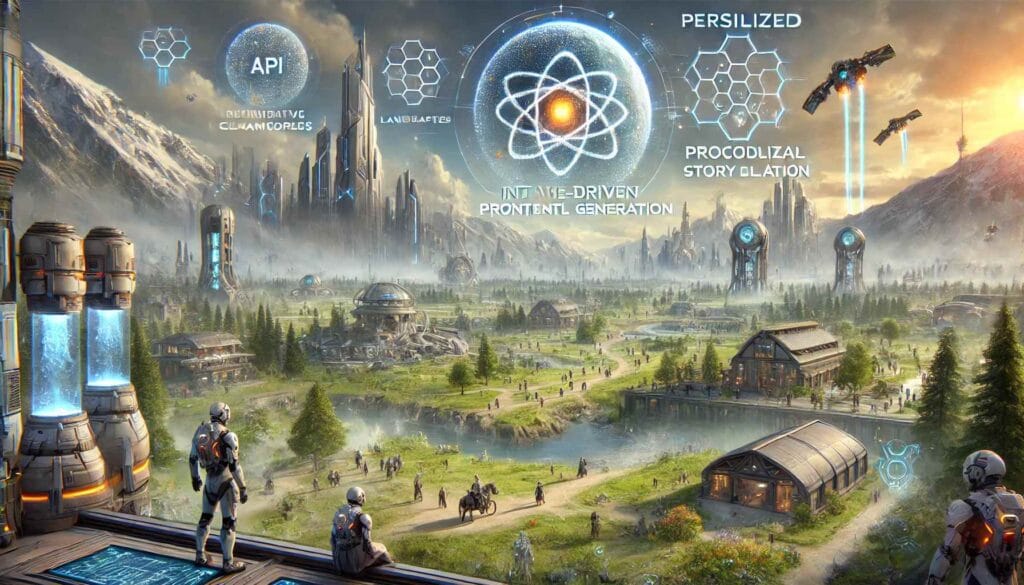The Future of AI-Designed Games: A New Era in Game Development

The rapid growth of artificial intelligence (AI) has already transformed many industries, and the world of video games is no exception. As AI continues to evolve, its potential to revolutionize game design is immense. AI could not only enhance the quality of games but also create entirely new experiences for players. Here’s a look at how AI might shape the future of gaming and introduce new features that were previously unimaginable.
1. Procedural Content Generation
One of the most exciting possibilities is AI-powered procedural content generation. Traditionally, creating expansive game worlds required immense amounts of manual design and programming. However, AI can automate much of this process, allowing for the creation of dynamic and ever-changing environments. Games could feature vast, unique worlds that are generated on the fly, offering an almost infinite amount of content for players to explore. AI could also adapt these worlds based on the player’s preferences, creating a personalized gaming experience.
2. Advanced NPC Behavior
Non-playable characters (NPCs) have long been a key element of video games, but they have often been limited in their behavior. AI has the potential to make NPCs far more complex and interactive. In the future, NPCs could respond to players’ actions in real-time, learning from their behavior and adapting accordingly. Instead of following predefined scripts, these characters could exhibit emotions, form relationships, and engage in complex dialogue, making the game world feel more alive and immersive.
3. Personalized Storytelling
AI could also revolutionize game narratives by creating personalized stories. Rather than having a fixed storyline, AI could analyze player choices and behaviors to adapt the plot in real-time. This means each player could experience a unique story, tailored to their actions and preferences. The story could evolve dynamically, influenced by the player’s interactions with the game world and other characters, making every playthrough distinct.
4. Dynamic Difficulty Adjustment
Another area where AI could have a significant impact is in adjusting the difficulty of games. Traditionally, game developers set a fixed difficulty level, but with AI, games could adapt to the player’s skill level and adjust the challenge accordingly. If a player is struggling, the AI might modify the game’s difficulty to help them progress. Conversely, if a player is breezing through the game, the AI could increase the difficulty, ensuring that the player remains engaged without feeling frustrated or bored.
5. Virtual Reality and AI Integration
As virtual reality (VR) technology continues to improve, the integration of AI could create even more immersive experiences. AI could adapt the VR environment based on the player’s physical movements, preferences, and even emotional responses. In addition, AI could enhance the realism of VR games by providing more interactive and intelligent NPCs, allowing for a truly lifelike and personalized experience.
6. AI-Driven Game Testing and Development
Game development is a time-consuming and often costly process, but AI could streamline many aspects of it. AI algorithms could assist in automating game testing, identifying bugs, and ensuring that the game runs smoothly across different platforms. Moreover, AI could help developers design levels, characters, and mechanics by predicting what elements will resonate with players based on data-driven insights.
7. Real-Time Voice and Gesture Recognition
In the future, AI could enable more natural forms of interaction within games. Players could use voice commands or even gestures to control characters or interact with the game world. AI-powered speech recognition could allow for more fluid conversations with NPCs, while gesture recognition could enable intuitive control in VR environments. This would lead to a more immersive and hands-on gaming experience.
8. Emotion Recognition and Adaptive Experiences
AI could also be used to detect a player’s emotional state through sensors or facial recognition. Based on this data, the game could adjust the experience to suit the player’s mood. For example, if the player is frustrated, the AI might make the game easier or provide helpful hints. Alternatively, if the player is highly engaged, the AI could increase the difficulty to keep them challenged. This would create a more empathetic gaming experience, where the game understands and responds to the player’s emotions.
Conclusion
The future of AI in gaming is full of exciting possibilities. As AI continues to advance, we can expect to see increasingly sophisticated and personalized gaming experiences. From procedurally generated worlds to adaptive NPC behavior and dynamic storytelling, AI is poised to change the way we play and experience video games. The future of gaming will likely be more immersive, interactive, and tailored to the individual player, thanks to the power of AI.
Source : Medium.com




